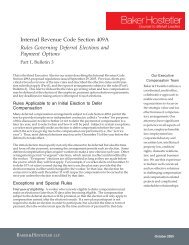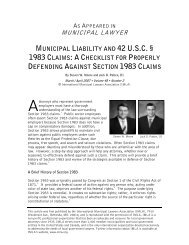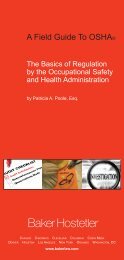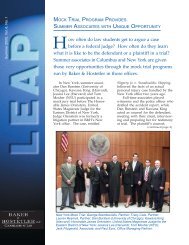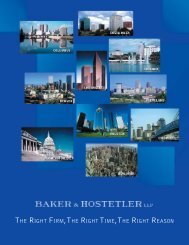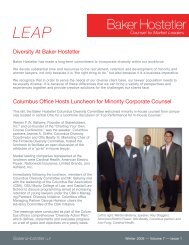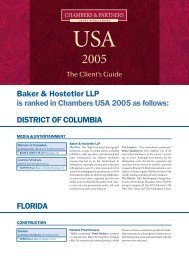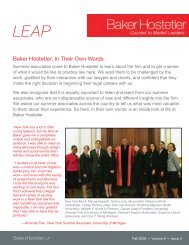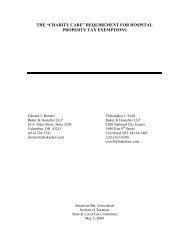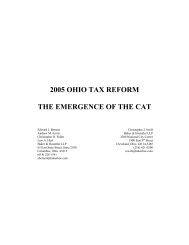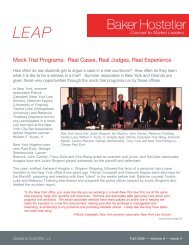Associates, Inc. v. First Pr<strong>in</strong>t, Inc., 798 S.W.2d 617, 620 (Tex. App.—Amarillo 1990, no writ).Similarly, if the judgment is set aside by a bill of review, that does not necessarily make theapplication wrongful. Id.The Deb<strong>to</strong>r may be entitled <strong>to</strong> damages for the wrongful conduct equal <strong>to</strong> the losssusta<strong>in</strong>ed as a result. G-W-L, Inc. v. Juneau, 486 S.W.2d 812, 814 (Tex. Civ. App.—Beaumont1972, writ ref’d n.r.e.). This may <strong>in</strong>clude the loss of use of the property and could extend <strong>to</strong>consequential damages such as damage <strong>to</strong> the bus<strong>in</strong>ess. Where no damages can be shown <strong>in</strong>a garnishment, the measure of damages is the legal rate of <strong>in</strong>terest on the money for the periodof its wrongful retention. Beutel v. Paul, 741 S.W.2d 510, 513 (Tex. App.—Hous<strong>to</strong>n [14 th Dist.]1987, no writ.). Damages for wrongful sequestration <strong>in</strong>clude not only the value of the propertysequestered, but also consequential damages. Adams v. Hood County Sand & Gravel Co., 354S.W.2d 593 (Tex. Civ. App.—Fort Worth 1962, writ ref’d n.r.e.). Damages may <strong>in</strong>clude lostprofits and loss of use. Commercial Credit Equipment Corp. v. Elliott, 414 S.W.2d 35 (Tex. Civ.App.—Eastland 1967, writ ref’d n.r.e.). Damages for mental anguish associated with a wrongfulgarnishment are generally not recoverable absent direct evidence of the nature, duration andseverity of the mental anguish, thereby establish<strong>in</strong>g a substantial disruption <strong>in</strong> the Deb<strong>to</strong>r’s dailyrout<strong>in</strong>e. Fischl v. Fischl, 2004 WL 1195705, *5 (Tex. App.—San An<strong>to</strong>nio 2004, no pet.).Damages may not be awarded for the failure of the Credi<strong>to</strong>r <strong>to</strong> prove, by apreponderance of the evidence, the specific facts alleged, if the failure is the result of a bonafide error. Tex. Civ. Prac. & Rem. Code § 62.045(b). A bona fide error is an error that is made<strong>in</strong> the course of a good-faith attempt at compliance with statu<strong>to</strong>ry requirements. Callaway v.East <strong>Texas</strong> Government Credit Union, 619 S.W.2d 411, 415 (Tex. Civ. App.—Tyler 1981, writref'd n.r.e.). It is the Credi<strong>to</strong>r's duty <strong>to</strong> show that a good faith attempt <strong>to</strong> comply with the statutewas made. Id. Absent evidence of any effort by the Credi<strong>to</strong>r <strong>to</strong> correct defects prior <strong>to</strong> theissuance of a Writ of Sequestration, bona fide error defense is not available. Id. The Credi<strong>to</strong>rmust prove the use of reasonable procedures <strong>to</strong> avoid the error. Tex. Civ. Prac. & Rem. Code §62.045(c).Punitive damages are recoverable only if the application was without probable causeand with malice. O’Hara v. Ferguson Mack Truck Co., 373 S.W.2d 507, 510 (Tex. Civ. App.—San An<strong>to</strong>nio 1963, writ ref’d n.r.e.); Burnettt Trailers, Inc. v. Polson, 387 S.W.2d 692, 695 (Tex.App.—San An<strong>to</strong>nio 1965, writ ref’d n.r.e.).If a Writ of Sequestration for consumer goods is dissolved, the Deb<strong>to</strong>r is entitled <strong>to</strong>reasonable at<strong>to</strong>rneys' fees and damages equal <strong>to</strong> the greater of:1. $100.002. the f<strong>in</strong>ance charge contracted for; or3. actual damages.Civ. Prac. & Rem. Code § 62.045(a).Another cause of action that the Deb<strong>to</strong>r may br<strong>in</strong>g aga<strong>in</strong>st the Credi<strong>to</strong>r is maliciousprosecution. A pla<strong>in</strong>tiff must suffer a special <strong>in</strong>jury before recover<strong>in</strong>g for malicious prosecutionof a civil case. <strong>Texas</strong> Beef Cattle Co. v. Green, 921 S.W.2d 203, 209 (Tex. 1996). The special<strong>in</strong>jury required for malicious prosecution is some physical <strong>in</strong>terference with a party's person orproperty <strong>in</strong> the form of an arrest, attachment, <strong>in</strong>junction, or sequestration. Id. Therefore, theCredi<strong>to</strong>r should be cognizant that seek<strong>in</strong>g the pre-judgment remedy for the wrong reasons maygive rise <strong>to</strong> a malicious prosecution cause of action.<strong>Page</strong> 34 of 36
Due <strong>to</strong> the fact that a bond is required <strong>in</strong> order <strong>to</strong> obta<strong>in</strong> a prejudgment Writ, the Credi<strong>to</strong>rand its surety may be jo<strong>in</strong>tly and severally liable <strong>to</strong> the Deb<strong>to</strong>r. Aetna Cas. & Sur. Co. v.Raposa, 560 S.W.2d 106, 110 (Tex. Civ. App.—Fort Worth 1977, writ granted and causedism’d).Generally, the at<strong>to</strong>rney for the Credi<strong>to</strong>r who prepared and filed the Writ is not liable forwrongful litigation conduct. Renfroe v. Jones & Associates, 947 S.W.2d 285 (Tex. App.—FortWorth 1997, writ denied) (hold<strong>in</strong>g that the at<strong>to</strong>rneys’ actions <strong>in</strong> represent<strong>in</strong>g their clients <strong>in</strong> agarnishment proceed<strong>in</strong>g were with<strong>in</strong> the context of discharg<strong>in</strong>g their duties and the at<strong>to</strong>rneyshave no duty <strong>to</strong> the Deb<strong>to</strong>r). However, where a Deb<strong>to</strong>r asserts that the at<strong>to</strong>rney for the Credi<strong>to</strong>rhad a wrongful and malicious motive, the at<strong>to</strong>rney may be liable. Mendoza v. Flem<strong>in</strong>g, 41S.W.3d 781, 787 (Tex. App.—Corpus Christi 2001, no writ) (no at<strong>to</strong>rney immunity if garnishmentwas sued <strong>to</strong> <strong>in</strong>jure political campaign by seiz<strong>in</strong>g funds that were exempt from garnishment).Most bonds have a twelve-month premium. Therefore, it is important <strong>to</strong> fac<strong>to</strong>r <strong>in</strong> theadditional bond premium cost if the litigation has not been resolved with<strong>in</strong> one year. TheCredi<strong>to</strong>r may have <strong>to</strong> pay another annual premium.Generally, a Credi<strong>to</strong>r is not entitled <strong>to</strong> at<strong>to</strong>rneys' fees for its collection efforts. MabonLtd. v. Afri-Carib Enterprises, Inc., 29 S.W.3d 291, 302 (Tex. App.—Hous<strong>to</strong>n [14 th Dist.] 2000,no writ). With limited exceptions, there is no substantive law permitt<strong>in</strong>g an award of at<strong>to</strong>rneys'fees <strong>in</strong> a suit <strong>to</strong> collect judgment. Robertson v. Robertson, 608 S.W.2d 245, 247 (Tex. Civ.App.—Eastland 1980, no writ). In a garnishment action, at<strong>to</strong>rneys’ fees are not recoverable.Beutel v. Paul, 741 S.W.2d 510, 513 (Tex. App.—Hous<strong>to</strong>n [14 th Dist.] 1987, no writ.). However,<strong>in</strong> a sequestration action, the Deb<strong>to</strong>r can recover at<strong>to</strong>rneys’ fees and damages aga<strong>in</strong>st theCredi<strong>to</strong>r if the writ is dissolved. Tex. Civ. Prac. & Rem. Code § 62.044(b); Monroe v. GMAC,573 S.W.2d 591, 594 (Tex. App.—Waco 1978, no writ).VI.ETHICAL CONSIDERATIONSA. ATTORNEY AS A WITNESSAll of the pre-judgment remedies described <strong>in</strong> this paper require support by an affidavit.In many cases, it is permissible for the counsel represent<strong>in</strong>g the Credi<strong>to</strong>r <strong>to</strong> execute the affidavitif that counsel has personal knowledge of the facts conta<strong>in</strong>ed there<strong>in</strong>. Although counsel mayexecute the affidavit, this practice should be avoided, if possible. When counsel for the Credi<strong>to</strong>rexecutes the affidavit, it <strong>in</strong>vites the Deb<strong>to</strong>r <strong>to</strong> argue that the Credi<strong>to</strong>r's counsel should bedisqualified from the case as a fact witness. While this is not necessarily the case, it does <strong>in</strong>vitepossible unnecessary consequences. When this is necessary, it should be noted that even ifcounsel has knowledge of relevant facts, counsel is not required <strong>to</strong> withdraw from the case asan <strong>in</strong>voluntary fact witness unless the testimony would be harmful <strong>to</strong> the client. Tex.Discipl<strong>in</strong>ary R. Prof. Conduct 3.08(b) (1989), repr<strong>in</strong>ted <strong>in</strong> Tex. Gov't Code Ann., tit. 2, subtit Gapp. (Vernons Supp. 2001) (State Bar Rules art. X, § 9).B. EX PARTE COMMUNICATIONS WITH THE COURTGenerally, an at<strong>to</strong>rney is prohibited from communicat<strong>in</strong>g, or caus<strong>in</strong>g another <strong>to</strong>communicate, ex parte with a Court for the purpose of <strong>in</strong>fluenc<strong>in</strong>g that Court concern<strong>in</strong>g thepend<strong>in</strong>g matter. Tex. Discipl<strong>in</strong>ary R. Prof. Conduct 3.05(b). There are certa<strong>in</strong> exceptions wherethe ex parte communications may be permitted by law and not prohibited by applicable rules ofpractice or procedure. Id. A matter is: (1) any adjudicary proceed<strong>in</strong>g, application, request for arul<strong>in</strong>g or other determ<strong>in</strong>ation, contract, claim, controversy, <strong>in</strong>vestigation, charge accusation,arrest, or other similar particular transaction <strong>in</strong>volv<strong>in</strong>g a specific party or parties or (2) any other<strong>Page</strong> 35 of 36



